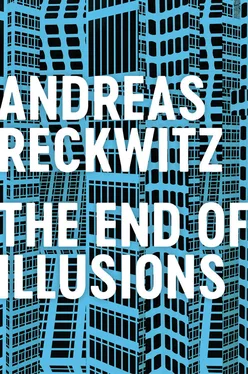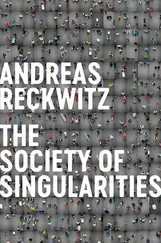Polity Press
65 Bridge Street
Cambridge CB2 1UR, UK
Polity Press
101 Station Landing
Suite 300
Medford, MA 02155, USA
All rights reserved. Except for the quotation of short passages for the purpose of criticism and review, no part of this publication may be reproduced, stored in a retrieval system, or transmitted, in any form or by any means, electronic, mechanical, photocopying, recording, or otherwise, without the prior permission of the publisher.
ISBN-13: 978-1-5095-4569-8
ISBN-13: 978-1-5095-4570-4 (paperback)
A catalogue record for this book is available from the British Library.
Library of Congress Cataloging-in-Publication Data
Names: Reckwitz, Andreas, author.
Title: The end of illusions : politics, economy, and culture in late modernity / Andreas Reckwitz ; translated by Valentine A. Pakis.
Other titles: Ende der Illusionen. English
Description: Cambridge, UK ; Medford, MA : Polity Press, [2021] | Includes bibliographical references and index. | Summary: “A leading social thinker examines the key structural features of our disillusioned age”-- Provided by publisher.
Identifiers: LCCN 2021000323 (print) | LCCN 2021000324 (ebook) | ISBN 9781509545698 (hardback) | ISBN 9781509545704 (paperback) | ISBN 9781509545711 (epub) | ISBN 9781509548057 (pdf)
Subjects: LCSH: Social history--21st century. | Social conflict. | Social change. | Populism. | Capitalism--Social aspects. | Culture. | Civilization, Modern--21st century.
Classification: LCC HN18.3 .R43413 2021 (print) | LCC HN18.3 (ebook) | DDC 306--dc23
LC record available at https://lccn.loc.gov/2021000323
LC ebook record available at https://lccn.loc.gov/2021000324
by Fakenham Prepress Solutions, Fakenham, Norfolk NR21 8NL
The publisher has used its best endeavors to ensure that the URLs for external websites referred to in this book are correct and active at the time of going to press. However, the publisher has no responsibility for the websites and can make no guarantee that a site will remain live or that the content is or will remain appropriate.
Every effort has been made to trace all copyright holders, but if any have been overlooked the publisher will be pleased to include any necessary credits in any subsequent reprint or edition.
For further information on Polity, visit our website: politybooks.com
Figures and Tables
Figures
2.1The social structure of West Germany in 1965. Ralf Dahrendorf’s ‘house model’ was originally published in Dahrendorf, Gesellschaft und Demokratie (Munich: R. Piper & Co., 1965, p. 516)
2.2 Percentage of the US population older than 25 who completed high school or college (by age group, 1940–2015). © United States Census Bureau
2.3 The three-class structure of late-modern society
2.4 Socio-cultural milieus according to the SINUS studies and their “translation” into the three-class model (pertaining to Germany in 2018). Published by the Sinus-Institut ( www.sinus-institut.de/sinus-loesungen/sinus-milieus-deutschland)
3.1 The development of employment and GDP in the Federal Republic of Germany, 1950–2017
3.2 Technological revolutions since 1770 (a graph based on the work of Carlota Perez)
3.3 The percentage change in employment share by job quality decile in OECD countries, 1979–1999. From Maarten Goos and Alan Manning, “Lousy and Lovely Jobs: The Rising Polarization of Work in Britain,” The Review of Economics and Statistics , 89:1 (February, 2007), pp. 118–33
3.4 The development of investment in tangible and intangible capital relative to GDP in Austria, the Czech Republic, Denmark, Finland, Germany, Italy, the Netherlands, Spain, Sweden, and Great Britain, 1998–2013. From Jonathan Haskel and Stian Westlake, Capitalism Without Capital (Princeton University Press, 2018). © Princeton University Press
3.5 The pyramid of goods
1.1Relations between Culturalization I and Culturalization II
5.1 The left–right distinction and political paradigms
5.2 Political paradigms and social problems since 1945
Introduction: The Disillusioned Present
It’s a strange thing. Some events that are retrospectively considered epoch-changing are perceived as merely marginal when they occur, whereas, in the case of others, one can remember precisely – even years later – the moment when “it happened,” and also one’s own feelings of bafflement, helplessness, fear, or incredulous joy in response to something seemingly impossible taking place.
Just as I still have vivid memories of “my” November 9, 1989 (the day the Berlin Wall came down) and “my” September 11, 2001 (the day of the terrorist attacks on the World Trade Center), the morning of November 9, 2016 is still present in my mind. Like many other people around the world, I felt a growing sense of unease during the months leading up to the American presidential election, which featured the surprising nomination of Donald Trump as the candidate for the Republican Party and his ugly, brutal campaign against Hillary Clinton, the candidate for the Democrats. On that morning, I checked the news on my tablet and was forced to accept that something had happened which, until the very last moment, I had been loath to admit as a real possibility: the populist candidate, who had made the headlines mostly because of his misogynistic and xenophobic demagoguery and his deep distrust of international cooperation and democratic institutions, and who seemed utterly unpredictable, had just been elected as the 45th President of the United States, thereby becoming the commander-in-chief of the leading Western nation. 1My reaction on that morning, and even weeks later, was one of horror. I had the feeling that things could fall apart, without knowing where this might lead: How was this possible, and how would things now proceed? It felt like a historical rupture.
Trump’s election, however, was not the only political earthquake that we have experienced in recent years. Elsewhere, too, elections and referenda have shaken up seemingly stable political orders. In June of 2016, a majority of British citizens voted for their country’s exit from the European Union. In the French presidential election of 2017, none of the candidates from established parties made it to the second round of voting, but the right-wing populist Marine Le Pen did. She then lost to Emmanuel Macron, the founder of the new liberal party En Marche!, who then in 2018 and 2019 had to confront large-scale protests by the gilets jaunes . In Italy, a (right-wing) populist government came to power in 2018, and in Hungary and Poland, two former model democracies in post-communist Europe, democratic institutions are now under attack. The European Union, which had been regarded by many as the inevitable outcome of political development on a continent that had learned from its past wars, as well as the traditional left–right schema for the landscape of the political parties have suddenly proved to be fragile. And we have experienced further uncertainties: in 2007, a system that many economists had extolled as a reliable money-making machine was brought to the brink of collapse by the global financial crisis. Terrorist attacks, such as the attack in Paris in 2015 (by the “Islamic State”) and the attack in Christchurch, New Zealand, in 2018 have demonstrated the fragile nature of everyday life in Western societies. There is a widespread feeling that, clearly, the danger is closing in.
Why do these events make people feel so unsettled? The answer may be painful. We no longer perceive these events as individual incidents that would allow us swiftly to return to our daily routines. Rather, a clear pattern has emerged: the hopeful expectations about the development of society, which many people in Western countries had harbored since the end of the Cold War in 1989/90, have been fundamentally disappointed, or at least relativized. Today, these expectations have been revealed to be illusions, and the result of this is disillusionment. This is true not only in Germany but, rather, in all Western societies, and in many respects it is even the case for global society. After 1990, the general tendency in the media, in politics, in business, and even in large swaths of intellectual debate was to weave a grand narrative of progress: of economic, political, social, cultural, and technological advancement. Borrowing from Hegel and Alexandre Kojève, the American political scientist Francis Fukuyama encapsulated this narrative with his concept of the “end of history.” It seemed as though we had come to the home stretch of world history and had achieved a condition in which the institutional orders of politics and economics had taken on a form that no longer needed to be changed – or even one that was impossible to change. 2From today’s perspective, this narrative seems rather naïve.
Читать дальше









